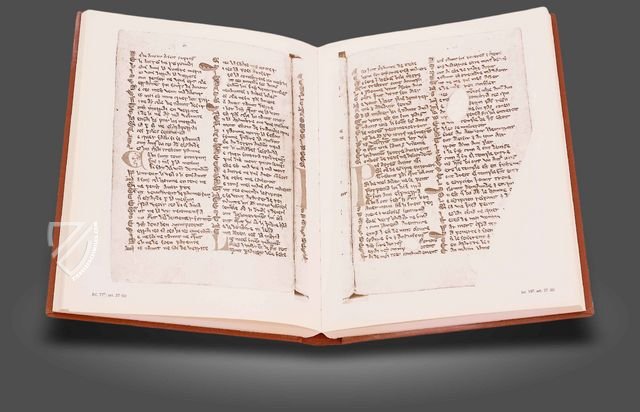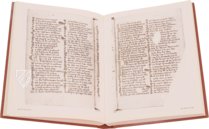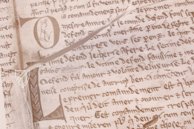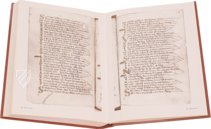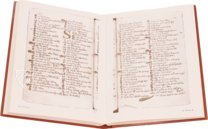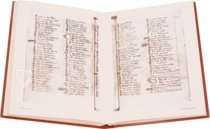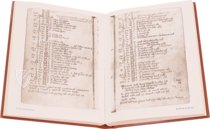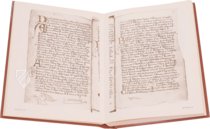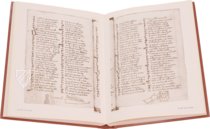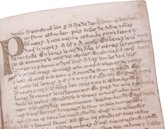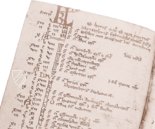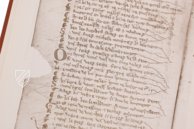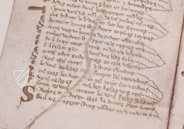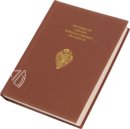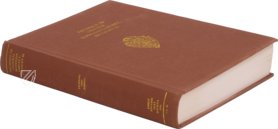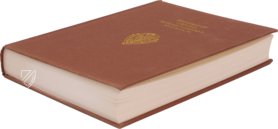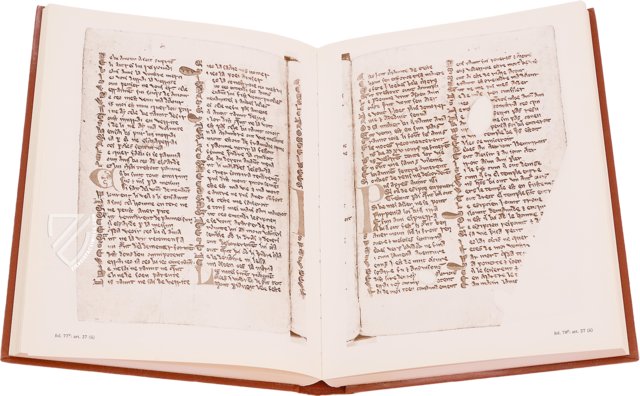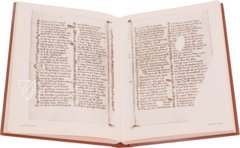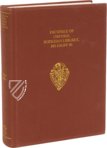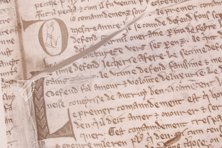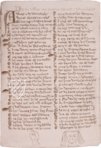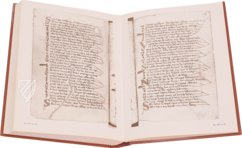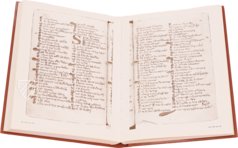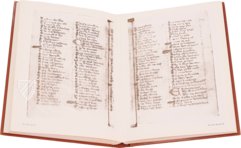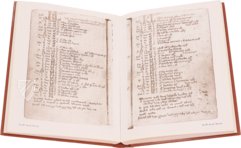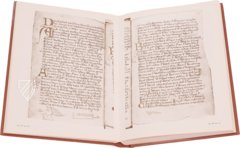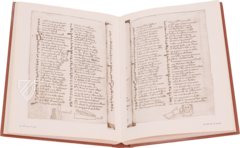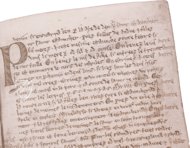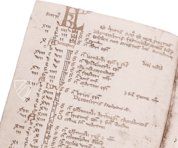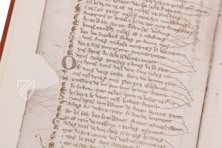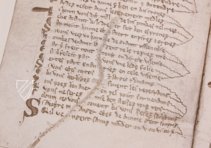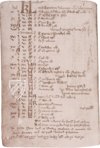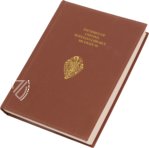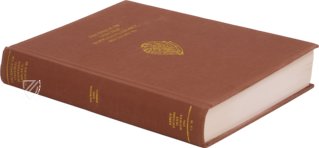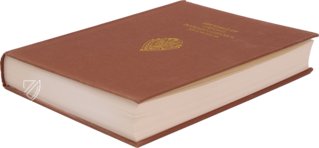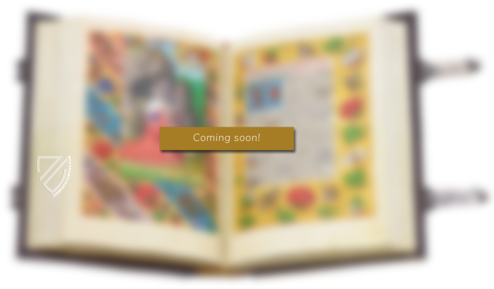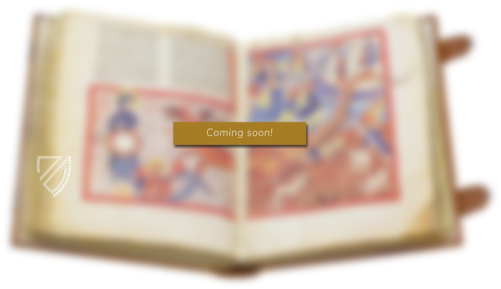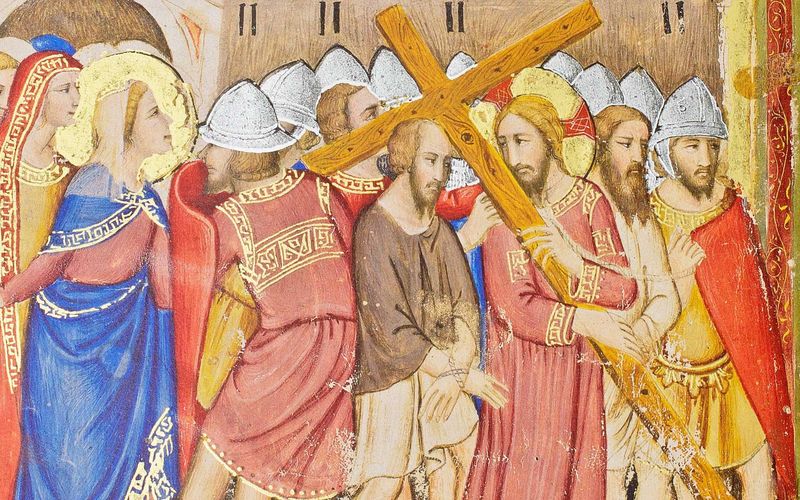Compilation of Oxford
(under 1,000€)
The Compilation of Oxford is one of the few surviving commonplace books from medieval England, i.e. a non-cohesive, notebook-like collection of a wide variety of texts. Originating from the late 13th century, the Oxford manuscript contains almost 100 texts in three different languages: Middle English, Anglo-Norman French, and Latin. They cover a broad spectrum of genres, from a liturgical calendar and religious songs to romantic poetry and proverbs as well as recipes, spells and prophecies. Some of the vernacular writings are not found in any other manuscript, making the codex an invaluable source for scholars of English and French linguistics and literature. It was compiled and written by Richard de Grimhill II (ca. 1263 - ca. 1308) for his own use over a period of 15 months and contains several later additions by his heirs. A unique insight into the everyday life of the educated nobility in the dawn of the Late Middle Ages.
Compilation of Oxford
With its marvelous variety of contents, the manuscript stored under the shelf mark MS Digby 86 in Oxford’s Bodleian Library is completely unique. On its last folio, the scribe signs off with a self-portrait – a cartoonishly-drawn male head wearing a close-fitted hood – and an inscription: scripsi librum in anno et iii mensibus – “I wrote the book in a year and three months”. His fifteen months' labor resulted in one of the most important miscellanies to survive from medieval England: quirky combinations of nearly 100 texts ranging from religion to science to secular literature and written in three languages: Middle English, Anglo-Norman French, and Latin. The so-called Compilation of Oxford includes medical recipes, charms, prayers, prognostications, magic tricks, pious doctrine, a liturgical calendar, religious songs, lively debates, poetry on love and death, proverbs, fables, fabliau, scurrilous games, and gender-based diatribes. Judging by the dialect used by the scribe, the manuscript originated in Gloucestershire or south Worcestershire from 1271-83.
A True Rarity
The fact that Digby is from the 13th century adds to its appeal, for English literary remnants from before 1300 are very rare. Scholars on both sides of the vernacular divide, French and English, are deeply intrigued by it. Some of its texts are found nowhere else, e.g. the French Arthurian Lay of the Horn and Strife between Two Ladies (a candid debate on feminine politics), and the English fabliau (comic, contrarian, and obscene tales originating from high medieval France) Dame Sirith and the fable The Fox and Wolf. It also contains the earliest surviving version of The Thrush and the Nightingale. The interpretations offered in this volume of its contents, presentation, and ownership, show that there is much to discover in Digby's lively **record of the social and spiritual pastimes of a book-owning gentry family. Aside from literary and religious texts, this is largely a handbook of practical information containing a calendar, a text on Arabic numerals, prognostications according to the day of the week on which Christmas falls, care of hunting birds, directions for calculating moveable feasts, and a list of English kings to Edward I. Two texts even deal with avoiding bad luck, one calculates lucky and unlucky days according to the moon, the other simply lists the unlucky days of the year – like feast days some are fixed and others are not.
History of the Manuscript
The manuscript was produced by the scribe Richard de Grimhill II (ca. 1263 – ca. 1308) for his own use and after his death seems to have passed to the Underhill family via his daughter Amice. Various marginal notes from members of the Underhill family along with a will appear in the manuscript. Thomas Allen (1540-1632) was a member of Trinity College, Oxford who acquired the book during the 16th century. The catalogue of his collection drawn up in 1622 lists Digby 86 as '80 A.I' with the reference number “I” written on f. 1r of the manuscript. The manuscript was bequeathed by Allen to Kenelm Digby (1603-65), who in turn donated it to the Bodleian Library in 1663.
Codicology
- Alternative Titles
- Sammelband von Oxford
Facsimile of Oxford, Bodleian Library, MS Digby 86 - Size / Format
- 420 pages / 20.6 × 14.0 cm
- Origin
- United Kingdom
- Date
- 1271–1283
- Epochs
- Style
- Script
- Anglicana
- Illustrations
- Red and black initials, about two dozen marginal sketches
- Content
- Compilation of 97 texts, including fables and romances, recipes, spells, as well as prayers and a calendar.
- Patron
- Richard de Grimhill II
- Artist / School
- Richard de Grimhill II (scribe)
- Previous Owners
- Richard de Grimhill II
Amice Grimhill
William Underhill
Thomas Allen
Kenhelm Digby
Compilation of Oxford
Le Chasteau d'amour
“Un rois estoit de grant pouer / De bon valour de grant sauer...”
So begins the best-known allegorical poem by Robert Grosseteste (ca. 1169–1253), which reflects upon the creation of the world and the Christian belief in redemption.
It is hardly surprising that a work by the influential English theologian, scholastic and later Bishop of Lincoln is also included in the Compilation of Oxford, as he was a prominent figure at the University of Oxford, where he taught in the 1220s.
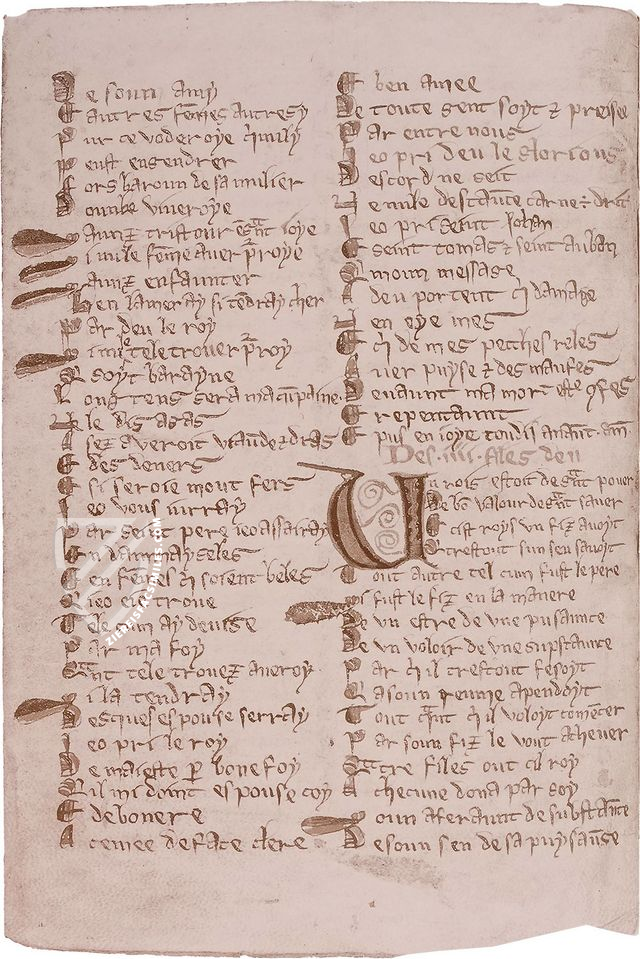
#1 Facsimile of Oxford, Bodleian Library, MS Digby 86
Language: English
(under 1,000€)
- Treatises / Secular Books
- Apocalypses / Beatus
- Astronomy / Astrology
- Bestiaries
- Bibles / Gospels
- Chronicles / History / Law
- Geography / Maps
- Saints' Lives
- Islam / Oriental
- Judaism / Hebrew
- Single Leaf Collections
- Leonardo da Vinci
- Literature / Poetry
- Liturgical Manuscripts
- Medicine / Botany / Alchemy
- Music
- Mythology / Prophecies
- Psalters
- Other Religious Books
- Games / Hunting
- Private Devotion Books
- Other Genres
- Afghanistan
- Armenia
- Austria
- Belgium
- Belize
- Bosnia and Herzegovina
- China
- Colombia
- Costa Rica
- Croatia
- Cyprus
- Czech Republic
- Denmark
- Egypt
- El Salvador
- Ethiopia
- France
- Germany
- Greece
- Guatemala
- Honduras
- Hungary
- India
- Iran
- Iraq
- Israel
- Italy
- Japan
- Jordan
- Kazakhstan
- Kyrgyzstan
- Lebanon
- Liechtenstein
- Luxembourg
- Mexico
- Morocco
- Netherlands
- Palestine
- Panama
- Peru
- Poland
- Portugal
- Romania
- Russia
- Serbia
- Spain
- Sri Lanka
- Sweden
- Switzerland
- Syria
- Tajikistan
- Turkey
- Turkmenistan
- Ukraine
- United Kingdom
- United States
- Uzbekistan
- Vatican City
- A. Oosthoek, van Holkema & Warendorf
- Aboca Museum
- Ajuntament de Valencia
- Akademie Verlag
- Akademische Druck- u. Verlagsanstalt (ADEVA)
- Aldo Ausilio Editore - Bottega d’Erasmo
- Alecto Historical Editions
- Alkuin Verlag
- Almqvist & Wiksell
- Amilcare Pizzi
- Andreas & Andreas Verlagsbuchhandlung
- Archa 90
- Archiv Verlag
- Archivi Edizioni
- Arnold Verlag
- ARS
- Ars Magna
- ArtCodex
- AyN Ediciones
- Azimuth Editions
- Badenia Verlag
- Bärenreiter-Verlag
- Belser Verlag
- Belser Verlag / WK Wertkontor
- Benziger Verlag
- Bernardinum Wydawnictwo
- BiblioGemma
- Biblioteca Apostolica Vaticana (Vaticanstadt, Vaticanstadt)
- Bibliotheca Palatina Faksimile Verlag
- Bibliotheca Rara
- Boydell & Brewer
- Bramante Edizioni
- Bredius Genootschap
- Brepols Publishers
- British Library
- C. Weckesser
- Caixa Catalunya
- Canesi
- CAPSA, Ars Scriptoria
- Caratzas Brothers, Publishers
- Carus Verlag
- Casamassima Libri
- Centrum Cartographie Verlag GmbH
- Chavane Verlag
- Christian Brandstätter Verlag
- Circulo Cientifico
- Club Bibliófilo Versol
- Club du Livre
- CM Editores
- Collegium Graphicum
- Collezione Apocrifa Da Vinci
- Comissão Nacional para as Comemorações dos Descobrimentos Portugueses
- Coron Verlag
- Corvina
- CTHS
- D. S. Brewer
- Damon
- De Agostini/UTET
- De Nederlandsche Boekhandel
- De Schutter
- Deuschle & Stemmle
- Deutscher Verlag für Kunstwissenschaft
- DIAMM
- Droz
- E. Schreiber Graphische Kunstanstalten
- Ediciones Boreal
- Ediciones Grial
- Ediclube
- Edições Inapa
- Edilan
- Editalia
- Edition Deuschle
- Edition Georg Popp
- Edition Leipzig
- Edition Libri Illustri
- Editiones Reales Sitios S. L.
- Éditions de l'Oiseau Lyre
- Editions Medicina Rara
- Editorial Casariego
- Editorial Mintzoa
- Editrice Antenore
- Editrice Velar
- Edizioni Edison
- Egeria, S.L.
- Eikon Editores
- Electa
- Emery Walker Limited
- Enciclopèdia Catalana
- Eos-Verlag
- Ephesus Publishing
- Ernst Battenberg
- Eugrammia Press
- Extraordinary Editions
- Fackelverlag
- Facsimila Art & Edition
- Facsimile Editions Ltd.
- Facsimilia Art & Edition Ebert KG
- Faksimile Verlag
- Feuermann Verlag
- Folger Shakespeare Library
- Franco Cosimo Panini Editore
- Friedrich Wittig Verlag
- Fundación Hullera Vasco-Leonesa
- G. Braziller
- Gabriele Mazzotta Editore
- Gebr. Mann Verlag
- Gesellschaft für graphische Industrie
- Getty Research Institute
- Giovanni Domenico de Rossi
- Giunti Editore
- Graffiti
- Grafica European Center of Fine Arts
- Guido Pressler
- Guillermo Blazquez
- Gustav Kiepenheuer
- H. N. Abrams
- Harrassowitz
- Harvard University Press
- Helikon
- Hendrickson Publishers
- Henning Oppermann
- Herder Verlag
- Hes & De Graaf Publishers
- Hoepli
- Holbein-Verlag
- Houghton Library
- Hugo Schmidt Verlag
- Idion Verlag
- Il Bulino, edizioni d'arte
- ILte
- Imago
- Insel Verlag
- Insel-Verlag Anton Kippenberger
- Instituto de Estudios Altoaragoneses
- Instituto Nacional de Antropología e Historia
- Introligatornia Budnik Jerzy
- Istituto dell'Enciclopedia Italiana - Treccani
- Istituto Ellenico di Studi Bizantini e Postbizantini
- Istituto Geografico De Agostini
- Istituto Poligrafico e Zecca dello Stato
- Italarte Art Establishments
- Jan Thorbecke Verlag
- Johnson Reprint Corporation
- Josef Stocker
- Josef Stocker-Schmid
- Jugoslavija
- Karl W. Hiersemann
- Kasper Straube
- Kaydeda Ediciones
- Kindler Verlag / Coron Verlag
- Kodansha International Ltd.
- Konrad Kölbl Verlag
- Kurt Wolff Verlag
- La Liberia dello Stato
- La Linea Editrice
- La Meta Editore
- Lambert Schneider
- Landeskreditbank Baden-Württemberg
- Leo S. Olschki
- Les Incunables
- Liber Artis
- Library of Congress
- Libreria Musicale Italiana
- Lichtdruck
- Lito Immagine Editore
- Lumen Artis
- Lund Humphries
- M. Moleiro Editor
- Maison des Sciences de l'homme et de la société de Poitiers
- Manuscriptum
- Martinus Nijhoff
- Maruzen-Yushodo Co. Ltd.
- MASA
- Massada Publishers
- McGraw-Hill
- Metropolitan Museum of Art
- Militos
- Millennium Liber
- Müller & Schindler
- Nahar - Stavit
- Nahar and Steimatzky
- National Library of Wales
- Neri Pozza
- Nova Charta
- Oceanum Verlag
- Odeon
- Orbis Mediaevalis
- Orbis Pictus
- Österreichische Staatsdruckerei
- Oxford University Press
- Pageant Books
- Parzellers Buchverlag
- Patrimonio Ediciones
- Pattloch Verlag
- PIAF
- Pieper Verlag
- Plon-Nourrit et cie
- Poligrafiche Bolis
- Presses Universitaires de Strasbourg
- Prestel Verlag
- Princeton University Press
- Prisma Verlag
- Priuli & Verlucca, editori
- Pro Sport Verlag
- Propyläen Verlag
- Pytheas Books
- Quaternio Verlag Luzern
- Reales Sitios
- Recht-Verlag
- Reichert Verlag
- Reichsdruckerei
- Reprint Verlag
- Riehn & Reusch
- Roberto Vattori Editore
- Rosenkilde and Bagger
- Roxburghe Club
- Salerno Editrice
- Saltellus Press
- Sandoz
- Sarajevo Svjetlost
- Schöck ArtPrint Kft.
- Schulsinger Brothers
- Scolar Press
- Scrinium
- Scripta Maneant
- Scriptorium
- Shazar
- Siloé, arte y bibliofilia
- SISMEL - Edizioni del Galluzzo
- Sociedad Mexicana de Antropología
- Société des Bibliophiles & Iconophiles de Belgique
- Soncin Publishing
- Sorli Ediciones
- Stainer and Bell
- Studer
- Styria Verlag
- Sumptibus Pragopress
- Szegedi Tudomànyegyetem
- Taberna Libraria
- Tarshish Books
- Taschen
- Tempus Libri
- Testimonio Compañía Editorial
- Thames and Hudson
- The Clear Vue Publishing Partnership Limited
- The Facsimile Codex
- The Folio Society
- The Marquess of Normanby
- The Richard III and Yorkist History Trust
- Tip.Le.Co
- TouchArt
- TREC Publishing House
- TRI Publishing Co.
- Trident Editore
- Tuliba Collection
- Typis Regiae Officinae Polygraphicae
- Union Verlag Berlin
- Universidad de Granada
- University of California Press
- University of Chicago Press
- Urs Graf
- Vallecchi
- Van Wijnen
- VCH, Acta Humaniora
- VDI Verlag
- VEB Deutscher Verlag für Musik
- Verlag Anton Pustet / Andreas Verlag
- Verlag Bibliophile Drucke Josef Stocker
- Verlag der Münchner Drucke
- Verlag für Regionalgeschichte
- Verlag Styria
- Vicent Garcia Editores
- W. Turnowski Ltd.
- W. Turnowsky
- Waanders Printers
- Wiener Mechitharisten-Congregation (Wien, Österreich)
- Wissenschaftliche Buchgesellschaft
- Wissenschaftliche Verlagsgesellschaft
- Wydawnictwo Dolnoslaskie
- Xuntanza Editorial
- Zakład Narodowy
- Zollikofer AG

